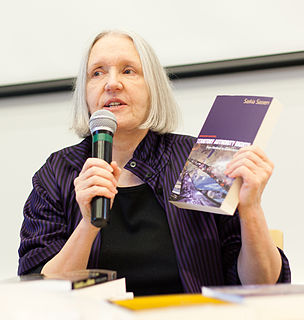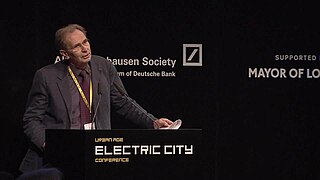Postmodernism is a broad movement that developed in the mid- to late 20th century across philosophy, the arts, architecture, and criticism, marking a departure from modernism. The term has been more generally applied to describe a historical era said to follow after modernity and the tendencies of this era.
Post-structuralism is a term for philosophical, theoretical and literary forms of theory that both build upon and reject ideas established by structuralism, the intellectual project that preceded it. Though post-structuralists all present different critiques of structuralism, common themes among them include the rejection of the self-sufficiency of structuralism, as well as an interrogation of the binary oppositions that constitute its structures. Accordingly, post-structuralism discards the idea of interpreting media within pre-established, socially-constructed structures.

Jean Baudrillard was a French sociologist, philosopher and cultural theorist. He is best known for his analyses of media, contemporary culture, and technological communication, as well as his formulation of concepts such as simulation and hyperreality. He wrote about diverse subjects, including consumerism, gender relations, economics, social history, art, Western foreign policy, and popular culture. Among his best known works are Seduction (1978), Simulacra and Simulation (1981), America (1986), and The Gulf War Did Not Take Place (1991). His work is frequently associated with postmodernism and specifically post-structuralism.
Hyperreality, in semiotics and postmodernism, is an inability of consciousness to distinguish reality from a simulation of reality, especially in technologically advanced postmodern societies. Hyperreality is seen as a condition in which what is real and what is fiction are seamlessly blended together so that there is no clear distinction between where one ends and the other begins. It allows the co-mingling of physical reality with virtual reality (VR) and human intelligence with artificial intelligence (AI).

David W. Harvey is a British-born Marxist economic geographer, podcaster and Distinguished Professor of anthropology and geography at the Graduate Center of the City University of New York (CUNY). He received his PhD in geography from the University of Cambridge in 1961. Harvey has authored many books and essays that have been prominent in the development of modern geography as a discipline. He is a proponent of the idea of the right to the city.

Simulacra and Simulation is a 1981 philosophical treatise by the sociologist Jean Baudrillard, in which the author seeks to examine the relationships between reality, symbols, and society, in particular the significations and symbolism of culture and media involved in constructing an understanding of shared existence.

Sir Nigel John Thrift, is a British academic and geographer. In 2018 he was appointed as Chair of the Committee on Radioactive Waste Management, a committee that gives independent scientific and technical advice on radioactive waste to the UK government and the devolved administrations. He is a Visiting Professor at the University of Oxford and Tsinghua University and an Emeritus Professor at the University of Bristol. In 2016 and 2017 he was the Executive Director of the Schwarzman Scholars, an international leadership program at Tsinghua University in Beijing. He was the Vice-Chancellor of the University of Warwick from 2006 to 2016. He is a leading academic in the fields of human geography and the social sciences.

Saskia Sassen is a Dutch-American sociologist noted for her analyses of globalization and international human migration. She is Robert S. Lynd Professor of Sociology at Columbia University and Centennial visiting Professor at the London School of Economics. Sassen coined the term global city.
Non-representational theory is the study of a specific theory focused on human geography. It is the work of Nigel Thrift. The theory is based on using social theory, conducting geographical research, and the 'embodied experience.'

Hyperrealism is a genre of painting and sculpture resembling a high-resolution photograph. Hyperrealism is considered an advancement of Photorealism by the methods used to create the resulting paintings or sculptures. The term is primarily applied to an independent art movement and art style in the United States and Europe that has developed since the early 1970s. Carole Feuerman is the forerunner in the hyperrealism movement along with Duane Hanson and John De Andrea.

John Richard Urry was a British sociologist who served as a professor at Lancaster University. He is noted for work in the fields of the sociology of tourism and mobility.
Jean Hillier is Professor Emerita in the Centre for Urban Research at RMIT University, Melbourne, Australia
Neil Robert Smith was a Scottish geographer and academic. He was Distinguished Professor of Anthropology and Geography at the Graduate Center of the City University of New York, and winner of numerous awards, including the Globe Book Award of the Association of American Geographers.
Owain Jones FGS is a Professor of Environmental Humanities at Bath Spa University (UK). He was previously Reader in Cultural Geography: Place, Nature and Landscape at the Countryside & Community Research Institute and member of staff of the Department of Geography and Environmental Management, Faculty of Environment and Technology, University of the West of England.
Dominic Pettman is a cultural theorist and author. He is University Professor of Media and New Humanities at The New School, teaching within the Culture and Media program at Eugene Lang College and also the Liberal Studies Program at the New School for Social Research. He has held previous positions at the University of Melbourne, the University of Geneva, and the University of Amsterdam. Pettman's work combines cultural studies, critical media studies, and philosophical approaches concerning topics ranging from new media, popular culture, affect theory, sound studies, and animal studies.
J. Richard Peet is emeritus professor of human geography at the Graduate School of Geography at Clark University in Worcester MA, USA. Peet received a BSc (Economics) from the London School of Economics, an M.A. from the University of British Columbia, and moved to the USA in the mid-1960s to complete a PhD in Geography from the University of California, Berkeley. He began teaching at Clark University shortly after completing his PhD from Berkeley, and has remained there with secondments in Australia, Sweden and New Zealand. He is married to geographer Elaine Hartwick and lives in central Massachusetts.

Post-Marxism is a trend in political philosophy and social theory which deconstructs Karl Marx's writings and Marxism proper, bypassing orthodox Marxism. The term post-Marxism first appeared in Ernesto Laclau and Chantal Mouffe's theoretical work Hegemony and Socialist Strategy. It can be said that post-Marxism as a political theory was developed at the University of Essex by Laclau and Mouffe. Philosophically, post-Marxism counters derivationism and essentialism. Recent overviews of post-Marxism are provided by Ernesto Screpanti, Göran Therborn and Gregory Meyerson.

Urban planning, also known as regional planning, town planning, city planning, or rural planning, is a technical and political process that is focused on the development and design of land use and the built environment, including air, water, and the infrastructure passing into and out of urban areas, such as transportation, communications, and distribution networks and their accessibility. Traditionally, urban planning followed a top-down approach in master planning the physical layout of human settlements. The primary concern was the public welfare, which included considerations of efficiency, sanitation, protection and use of the environment, as well as effects of the master plans on the social and economic activities. Over time, urban planning has adopted a focus on the social and environmental bottom-lines that focus on planning as a tool to improve the health and well-being of people while maintaining sustainability standards. Sustainable development was added as one of the main goals of all planning endeavors in the late 20th century when the detrimental economic and the environmental impacts of the previous models of planning had become apparent.. Similarly, in the early 21st century, Jane Jacob's writings on legal and political perspectives to emphasize the interests of residents, businesses and communities effectively influenced urban planners to take into broader consideration of resident experiences and needs while planning.
Richard K. Ashley is a postmodernist scholar of International relations. He is an associate professor at the Arizona State University's School of Politics and Global Studies.
The Singular Objects of Architecture is a book written by French philosopher, Jean Baudrillard. It consists of the two conversations that he had with French architect, Jean Nouvel in 1997 at Maison des Ecrivains and the University of Paris VI-La Villette School of Architecture. In this book, Baudrillard deals with fundamental issues such as politics, identity, and aesthetics, and explores the possibilities of modern architecture and the future of our modern life.








